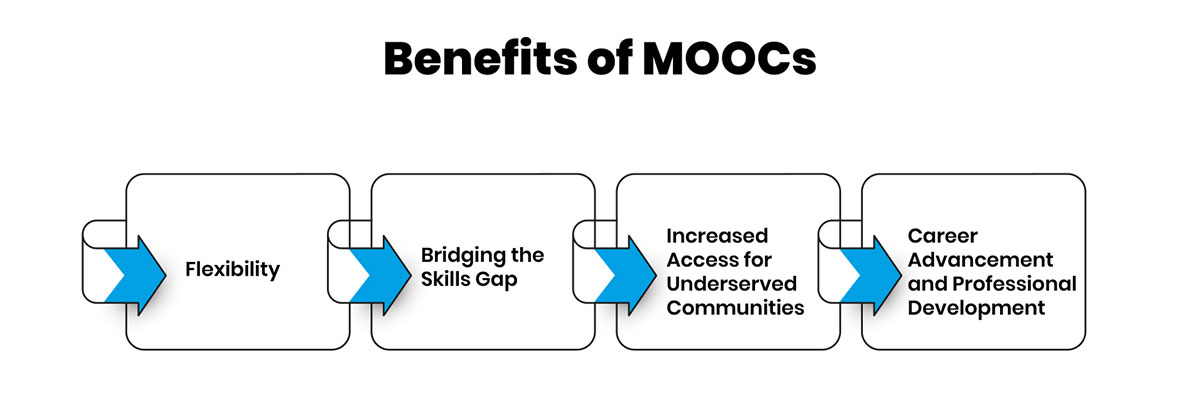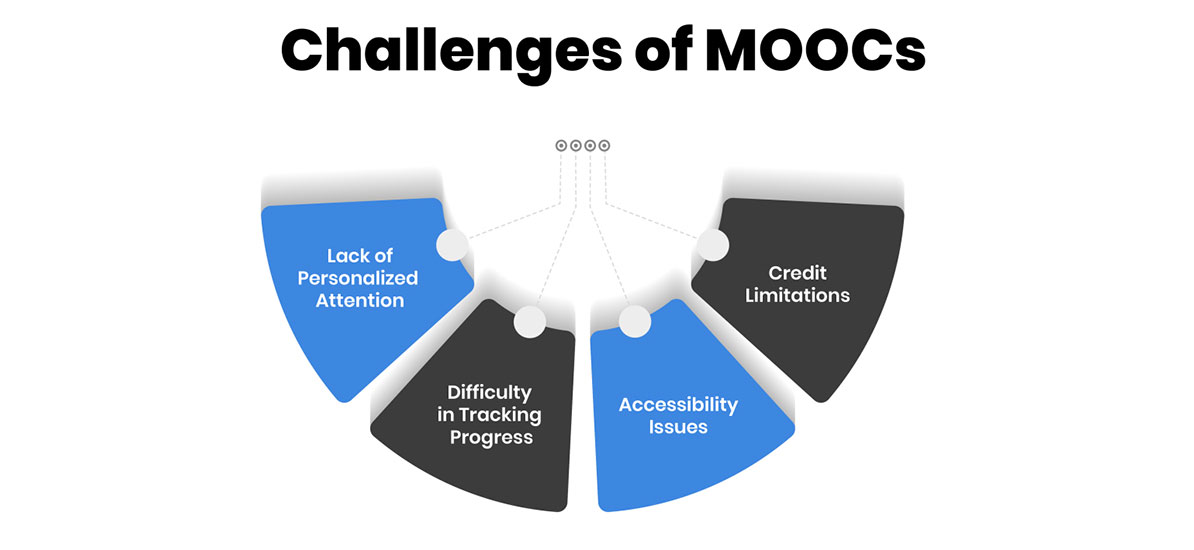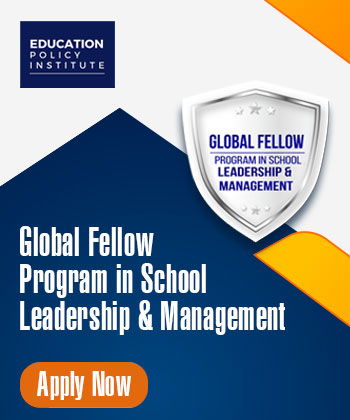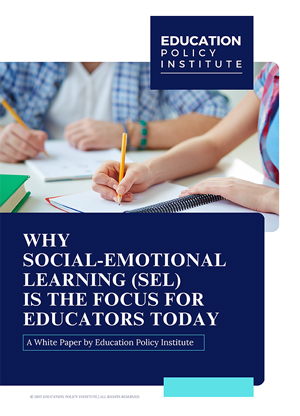Massive Open Online Courses (MOOCs) have significantly transformed the educational landscape since their emergence in the early 2000s. These online courses offer free access and unrestricted participation to a global audience, providing a flexible and diverse learning environment. MOOCs are categorized into two types: cMOOCs, which focus on collaborative learning and dynamic content development through participant interactions, and xMOOCs, which follow a traditional, structured approach with predefined materials. The rise of MOOCs has challenged traditional education models, promoting self-paced learning and skill development, and has become particularly crucial during the COVID-19 pandemic, which accelerated the shift to online education.
Despite their transformative potential, MOOCs face challenges such as ensuring course quality, maintaining learner engagement, and effective assessment. Nonetheless, the continuous evolution of MOOCs, driven by technological advancements and increasing acceptance of online education, suggests a promising future for these digital learning platforms.
The Transformative Evolution of MOOC
The history of Massive Open Online Courses (MOOCs) is a testament to the transformative power of digital education. Emerging from the experimental landscape of online learning platforms in the early 2000s, MOOCs found their defining moment in 2008 when the term was first coined by George Siemens and Stephen Downes. Their course, "Connectivism and Connective Knowledge," offered a glimpse into the potential of open online learning, attracting both paying students and free participants. However, it was the seismic impact of Stanford professors Sebastian Thrun and Peter Norvig's MOOC on artificial intelligence in 2011 that truly propelled MOOCs into the mainstream. Drawing an unprecedented 160,000 sign-ups globally, this course demonstrated the massive demand for accessible and high-quality online education.
Pioneered by prestigious institutions, MOOCs quickly gained traction, offering learners around the world an opportunity to access courses from top universities often at little to no cost. The launch of leading platforms such as Coursera, edX, and Udacity between 2012 and 2014 further fueled the MOOC revolution. These platforms partnered with universities to offer a wide array of courses, breaking down geographical and financial barriers to education. The global massive open online course (MOOC) market is projected to grow at a compound annual growth rate (CAGR) of 32% from 2024 to 2034, boosting its market value from $13.2 billion in 2024 to $212.7 billion by the end of 2034. This proliferation of MOOCs marked a significant shift in the educational paradigm, democratizing access to knowledge and transforming the way people engage with learning.
The evolution of MOOCs represents not just a technological advancement but a fundamental reimagining of education in the digital age. By leveraging technology to deliver high-quality content in an open and accessible format, MOOCs have democratized learning on a global scale. The open nature of MOOCs, allowing anyone with an internet connection to participate, has shattered traditional barriers to education.
Impact of MOOCs on Education
MOOCs have had a profound impact on the educational landscape, reshaping how education is accessed, delivered, and experienced. For individual learners, MOOCs offer unprecedented flexibility and convenience. Learners can pursue their educational goals from anywhere in the world and at their own pace. This self-directed nature empowers individuals to tailor their learning journeys to their specific interests and needs. The vast array of courses available—from computer science to the humanities—allows learners to engage with diverse subjects, developing a culture of continuous learning and skill development.
MOOCs have democratized access to specialized knowledge, breaking down geographical and socioeconomic barriers. They provide opportunities for learners to engage with experts and industry leaders globally, offering insights and perspectives that were previously out of reach. During the COVID-19 pandemic, MOOCs played a crucial role in ensuring educational continuity.
With physical classrooms closed, MOOCs allowed millions of students to continue their studies from the safety of their homes. This was particularly important in developing countries, where access to technology and online resources is often limited. By providing free or low-cost education, MOOCs helped bridge the digital divide and ensured that learners in these regions were not left behind.
In addition to individual benefits, MOOCs have significantly influenced the broader educational ecosystem. They have increased access to education, addressing inequality by offering courses from leading institutions at minimal or no cost. MOOCs have also promoted lifelong learning, enabling individuals to continue their education and skill development well beyond traditional degree programs. This flexibility is particularly valuable for workforce development, allowing professionals to upskill or reskill as job market demands evolve.
MOOCs have driven innovation in teaching by introducing pedagogical advances such as short videos, interactive assignments, and peer collaboration. These methods enhance engagement and learning outcomes, making education more interactive and accessible. MOOCs also supplement traditional campus-based education, allowing students to enhance their studies and reduce costs by taking additional online courses.
Despite some challenges, such as the need for digital literacy and varied pricing structures, MOOCs remain a transformative force in education. They promote accessibility, inclusivity, and continuous learning, preparing learners to thrive in an ever-changing world. As MOOCs continue to evolve, they hold the promise of further reshaping education, making it more equitable and responsive to the needs of learners globally.
Benefits and Challenges of MOOCs
Massive Open Online Courses have revolutionized education by offering numerous benefits while also presenting certain challenges. The flexibility and accessibility of MOOCs have made them a popular choice for learners worldwide, but they also face limitations that need to be addressed.
• Benefits of MOOCs

-
Flexibility:
MOOCs allow learners to progress at their own pace, breaking free from the constraints of time and location. This flexibility is particularly advantageous for adult learners who juggle work or family commitments, as they can access education on their schedule. -
Bridging the Skills Gap:
MOOCs address challenges in various industries by providing training and certification programs aligned with in-demand job skills. They offer practical solutions to the rapid evolution of technology in the job market, helping learners stay relevant and competitive. -
Increased Access for Underserved Communities:
MOOCs open educational doors for individuals in low-income brackets, rural areas, and working professionals who previously had limited access to education. By facilitating education and training that were beyond reach, MOOCs promote inclusivity and democratize learning. -
Career Advancement and Professional Development:
MOOCs empower individuals to earn degrees, certifications, and badges online, fostering career progression and enhancing earning potential. They provide continuous professional development opportunities, enabling learners to advance their careers.
• Challenges of MOOCs

-
Lack of Personalized Attention:
MOOCs cannot provide personalized courseware and individual attention from tutors, which can affect the learning experience for some students. -
Difficulty in Tracking Progress:
It is challenging to keep exact track of students' assignments and involvement, which can lead to issues with monitoring progress and providing timely feedback. -
Accessibility Issues:
Learners with disabilities and those with poor internet connections may struggle to use MOOCs effectively. Additionally, language barriers can hinder the accessibility of MOOCs for non-native speakers. -
Credit Limitations:
Currently, MOOCs cannot be used as credit-earning courses at many universities, limiting their appeal for students seeking formal academic recognition.
A Glimpse into the Future of MOOCs
MOOCs holds immense promise, with the potential to further revolutionize education and transform the way we learn. Key trends likely to shape the future of MOOCs include:
Personalized Learning: AI-powered adaptive learning systems will tailor MOOCs to the individual needs and learning styles of each participant, providing a truly personalized learning experience. This customization will ensure that learners engage with content that is most relevant and beneficial to their unique educational journeys.
Microcredentials and Skills Badges: MOOCs will increasingly offer microcredentials and skills badges, giving learners tangible recognition of their achievements. These credentials will enhance employability by validating specific skills and knowledge, making learners more attractive to potential employers.
Immersive Learning Experiences: The integration of virtual reality (VR) and augmented reality (AR) technologies into MOOCs will create immersive and interactive learning environments. These technologies will enable learners to participate in hands-on, practical experiences that replicate real-world scenarios, thereby enhancing the learning experience.
Global Collaboration and Knowledge Sharing: MOOCs will continue to promote cross-cultural collaboration and knowledge sharing, breaking down geographical barriers and fostering global understanding. This global reach will enrich the learning experience by incorporating diverse perspectives and expertise into the virtual classroom.
Conclusion
In the rapidly evolving educational landscape, MOOCs stand out as a beacon of innovation and inclusivity. They have not only broadened access to quality education across the globe but also introduced flexible, personalized, and immersive learning experiences that cater to diverse needs. As we look to the future, the integration of advanced technologies and the strengthening of partnerships between educational platforms and employers promise to further enhance the impact of MOOCs. This ongoing evolution ensures that MOOCs will continue to break down barriers, empower learners, and shape a more equitable and dynamic educational ecosystem. The journey of MOOCs is a testament to the power of digital education to transform lives, foster continuous growth, and build a globally connected learning community.
Latest
Trends blogs
- From Vision to Impact: Closing the Gender Gap in STEM Education
- Automation, Artificial Intelligence, and the Future of Human-Centered Education
- Mid-Career Education in a Changing Labor Market
- The Next Phase of STEM Education: The Role of Artificial Intelligence in Classroom Curricula
Focus blogs
- Research-Driven Education: Strengthening Strategies, Policies, and Classroom Practice
- Professional Certifications for Career Growth: What Students and Young Professionals Need to Know
- Building a High-Impact Center of Excellence: What You Need to Know
- Beyond Graduation: The Importance of Lifelong Learning in Higher Education





